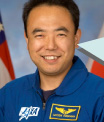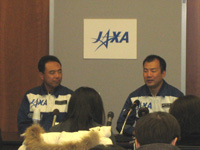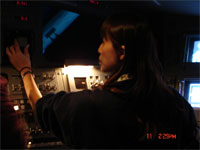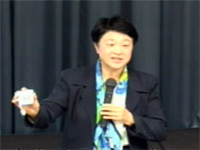Astronaut Furukawa assigned to ISS Expedition Crew

Astronaut Furukawa during ISS crew training(©JAXA/GCTC)
Astronaut Furukawa was assigned as an Expedition 28/29 crew member. He is scheduled to stay aboard the ISS for about six months from the spring of 2011.
On Expedition 28/29, astronaut Furukawa will focus on activities related to space utilization, mainly scientific experiments for Japan and the international partners during his stay aboard the ISS.
He is scheduled to participate in various training sessions required to obtain knowledge and qualifications to operate the facilities and the science experiments aboard the ISS and to operate the Soyuz TMA spacecraft, while continuing training as a backup for astronaut Noguchi.
 |
I’d like to express my sincere thanks to all those who have supported and are supporting me. |
Simulation Training for STS-119 Mission
Astronaut Wakata, scheduled to start his stay aboard the ISS in March 2009, participated in simulator training on shuttle operations he will conduct during the STS-119 Mission with the other STS-119 crew members.
Astronaut Wakata received training on grappling and removing the S6 truss segment from the shuttle’s payload bay using the Space Station Remote Manipulator System (SSRMS) and on deploying the Solar Array Wing (SAW) of the S6 truss.
The crew also conducted a fire drill assuming a fire inside the ISS and reviewed the evacuation procedures to the Soyuz TMA spacecraft. In addition, they reviewed the procedures for boarding the Space Shuttle and performed an evacuation drill assuming an emergency situation had occurred in the space shuttle.
ISS Expedition Operations Training in Russia
Astronaut Noguchi, who is assigned as an Expedition 22/23 crew member, and astronaut Furukawa, his backup, participated in training on the ISS Russian modules and the Soyuz TMA spacecraft at the Gagarin Cosmonaut Training Center (GCTC) in Russia.
Using a Soyuz TMA spacecraft simulator, astronaut Noguchi ran through the procedures for a manual approach to the ISS and the procedures for a manual re-entry. He also reviewed the structural configurations and layouts of the Russian modules.
Astronaut Furukawa participated in all the training sessions astronaut Noguchi has participated in. In addition, he participated in training on the Russian module’s attitude control system, water supply system, toilets, and galley facilities.

Astronauts Noguchi (right) and Furukawa (left) at press briefing
While staying in Russia, astronauts Noguchi and Furukawa attended a press briefing with Japanese media in Moscow. Astronaut Noguchi explained the activities he will perform during his stay in the ISS.
Astronaut Noguchi expressed his hopes and ambitions for the mission, saying that he hopes to have numerous opportunities to convey space activities and messages to people in Japan from space.
SRMS Operations Training

Astronaut Yamazaki operating SRMS simulator
Astronaut Yamazaki is participating in operations training for the Space Shuttle’s Remote Manipulator System (SRMS) at NASA’s Johnson Space Center (JSC).
Astronaut Yamazaki learned basic operations of the SRMS using the console at the dome-shaped mock-up facility that simulates the shuttle’s flight deck. She will proceed to more complicated robotics operations training such as payload grappling and troubleshooting techniques to cope with SRMS anomalies.
NIPR-JAXA Joint Press Conference

Astronaut Mukai at press conference
Astronaut Mukai, along with Professor Kentaro Watanabe of the National Institute of Polar Research (NIPR), held a press conference at JAXA’s Tokyo office to explain their joint biomedical study. Astronaut Mukai is now serving as the head of JAXA’s Space Biomedical Research Office.
Focusing on the similarities between the environments of Antarctica and space, NIPR and JAXA will jointly conduct the biomedical research utilizing Japanese Antarctica Station (Showa Station) as a simulated space environment.
Aiming at improving health management technologies for long-duration spaceflights and stays in Antarctica, the joint project team will investigate 1) effects of unusual daylight patterns on human biological rhythm, 2) effectiveness of newly developed exercise methods, and 3) hygiene techniques in situations where baths are few and far between.
Astronaut Mukai expressed her enthusiasm for the joint project, saying that these studies will benefit broader health care technologies in the future.


